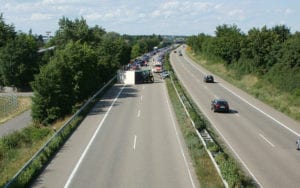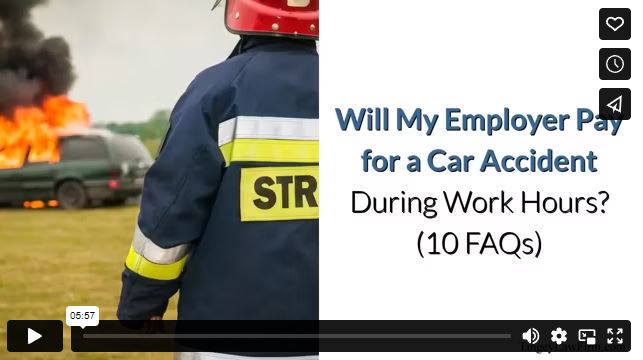In Nevada, as in many other states, employers are liable for employees’ mistakes under the legal principle of respondeat superior. Respondeat superior means ‘the superior must answer.’ The concept of respondeat superior, a form of vicarious liability, spreads risk amongst a group or organization. Respondeat superior implies that human-error mistakes that happen during the course of work are, indeed, the responsibility of the employer and not the employee.
If you can provide evidence that you are reasonably performing your work duties – even reasonable personal duties – during work hours, then you may be able to sue your employer to receive compensation for any injuries or damages that you sustain during work hours. In other words, if you make a mistake during your work hours resulting in injury to yourself or to others, then your employer may be liable to cover the costs of your mistake.

(WikimediaImages / pixabay)
Let’s look at some frequently asked questions about car accidents during work hours.
Is the employer responsible if an employee causes a car accident while driving a company car?
In most situations, the answer to this question is yes. Under the principle of respondeat superior, the employer is liable for all costs incurred in a traffic accident caused with a vehicle used by an employee while working, even if the accident was caused by the employee’s negligence or poor judgement.
Is the employer responsible if an employee causes a car accident while driving a private vehicle to perform work duties?
Yes. An employer is generally responsible for any costs incurred when an employee causes a car accident while performing work duties, even if the car is privately owned. Whether a boss lends a car to an employee, or whether an employee is driving their own car, the principle remains in place.
The respondeat superior principle applies, for example, to pizza delivery drivers who use their own vehicles, or to au pairs who are driving their employee’s vehicles, or even to an employee who uses their own car to drive from Summerlin to Henderson to pick up a catered lunch for a retirement party at the office.
Is the employer responsible for paying for injuries to another person or persons involved in the accident in addition to the driver?
Yes, the employer (or the employer’s insurance) is responsible to pay for personal injuries to any other people involved in the accident. This could include pedestrians, bikers, drivers of other vehicles, as well as passengers in the offending car.
Is the employer responsible for paying for personal injuries to the employee who was driving when the accident occurred?
Generally speaking, the employer is responsible for paying for any personal injuries to the employee who was driving when the accident occurred, even if the employee’s own negligence caused the accident.
One way to imagine how this law works is to imagine a faulty plumbing job in a new house. If you were to sue for faulty plumbing in your new house, you wouldn’t sue the two workers who installed the plumbing. You’d sue the entire company, and let the company deal with the two negligent workers.
In a similar way, a car accident caused by a single employee won’t fall on the individual employee’s shoulders but will be carried by the company at large.
Is the employer responsible for paying for property damage as well as personal injury?
Yes, the legal culpability includes financial compensation for both property damage and personal injuries caused by an employee’s car accident.
What if substance abuse was involved with the employee’s poor judgment when the car accident occurred?
You should talk to a traffic accident attorney to understand your rights in a situation that involves substance abuse. While certain reasonable mistakes may be assumed to accrue in any situation where human error may be a factor, substance abuse, or other blatant violations of state or federal laws, make a situation unique. Most personal injury lawyers offer an initial consultation without cost. An initial consultation will help you and the lawyers ascertain the relevance to your unique situation.
What if the employee was looking at a cell phone when the accident occurred? Is the employer responsible for an ensuing car accident?
See above.
What if the employee was speeding when the accident occurred? Is the employer responsible for an ensuing car accident?
Generally speaking, yes, the employer would still be responsible for your actions, even if you were speeding. You will want to speak with a lawyer to learn how the law applies to your personal situation.
What if the employee was mixing personal errands with business errands when s/he got into a car accident? Is the employer responsible for an ensuing car accident?
The legal experts and insurance companies will likely hash out the answer to this question in some detail, should your case go to court. If your driving was for personal reasons and not at all work-related, then you will be liable for any accidents you cause. For example, if you drive a personal car during a lunch break to run personal errands, then you must take full responsibility for any accidents. But if you were mixing personal errands with work errands, then you probably have a case.
Is the employer liable for accident costs incurred during an employee’s commute? What if the employee uses a company car for the commute?
Commute time is generally not considered work-time, and any accidents that occur during a commute would not likely be the responsibility of the employer. This is true even if you are driving a company vehicle.
However, if you have to drive somewhere other than the usual place of employment, or if you have to make work-related stops during the commute, then your employer may be liable for any car accidents along the way.
Video

